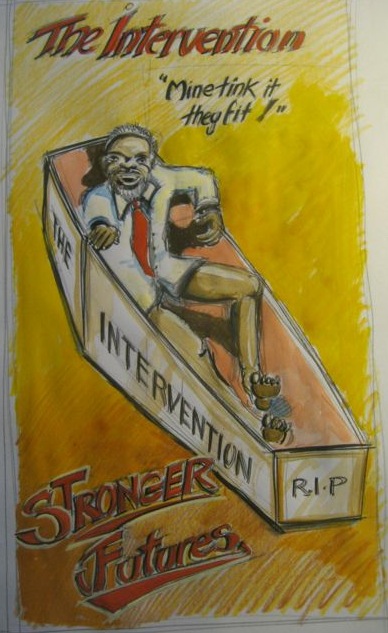Ashann Thardoor writes ‘The dark side of Winston Churchill’s legacy no one should forget’
It’s been 50 years since the funeral of the man voted the ‘greatest Briton’, but there was a callous side to the British Bulldog’s career. There’s no Western statesmen – at least in the English-speaking world – more routinely lionized than Winston Churchill. Last Friday marked a half century since his funeral, an occasion that itself led to numerous commemorations and paeans to the British Bulldog, whose moral courage and patriotism helped steer his nation through World War II.
Churchill, after all, has been posthumously voted by his countrymen as the greatest Briton. The presence (and absence) of his bust in the White House in Washington, DC was enough to create political scandal on both sides of the pond. The power of his name is so great that it launches a thousand quotations, many of which are apocryphal. At its core, Churchill’s myth serves as a ready-made metaphor for boldness and leadership, no matter how vacuous the context in which said metaphor is deployed.
I hate Indians. They are a beastly people with a beastly religion.
Winston Churchill
For example, former British prime minister Tony Blair earned comparisons to Churchill after dragging his country into the much-maligned 2003 Iraq war. So too Israeli Prime Minister Benjamin Netanyahu, whose tough stance on Iran’s nuclear ambitions has been cast by some in Churchill’s heroic mould – the Israeli premier’s uncompromising resolve a foil to the supposed “appeasement” tendencies of President Barack Obama.
In the West, Churchill is regarded as a freedom fighter, the man who grimly withstood Nazism and helped save Western liberal democracy. It’s a civilisational legacy that has been built up over decades. Churchill “launched the lifeboats”, declared Time magazine, on the cover of its January 1950, issue, which hailed the British leader as the “man of the half century”.
But there’s another side to Churchill’s politics and career that should not be forgot amid the endless parade of eulogies. To many outside the West, he remains an unvarnished racist and a stubborn imperialist, forever on the wrong side of history.
Churchill’s detractors point to his well-documented bigotry, articulated often with shocking callousness and contempt. “I hate Indians,” he once trumpeted. “They are a beastly people with a beastly religion.”
He referred to Palestinians as “barbaric hordes who ate little but camel dung”. When quashing insurgents in Sudan in the earlier days of his imperial career, Churchill boasted of killing three “savages”. Contemplating restive populations in northwest Asia, he infamously lamented the “squeamishness” of his colleagues, who were not in “favour of using poisoned gas against uncivilised tribes”.
At this point, you may say, so what? Churchill’s attitudes were hardly unique for the age in which he expounded them. All great man have flaws and contradictions – the American founding fathers, those great paragons of liberty, were slave owners. One of Churchill’s biographers, cited by The Washington Post’s Karla Adam, insists that his failings were ultimately “unimportant, all of them, compared to the centrality of the point of Winston Churchill, which is that he saved [Britain] from being invaded by the Nazis”.
But that should not obscure the dangers of his world view. Churchill’s racism was wrapped up in his Tory zeal for empire, one which irked his wartime ally, United States president Franklin D Roosevelt. As a junior member of parliament, Churchill had cheered on Britain’s plan for more conquests, insisting that its “Aryan stock is bound to triumph”. It’s strange to celebrate his bravado in the face of Hitler’s war machine and not consider his wider thinking on other parts of the world. After all, these are places that, just like Europe and the West, still live with the legacy of Churchill’s and Britain’s actions at the time.
India, Britain’s most important colonial possession, most animated Churchill. He despised the Indian independence movement and its spiritual leader, Mahatma Gandhi, whom he described as “half-naked” and labelled a “seditious fakir”, or holy man. Most notoriously, Churchill presided over the hideous 1943 famine in Bengal, where some 3 million Indians perished, largely as a result of British imperial mismanagement. Churchill was both indifferent to the Indian plight and even mocked the millions suffering, chuckling over the culling of a population that bred “like rabbits”.
Leopold Amery, Churchill’s secretary of state for India, likened his boss’ understanding of India’s problems to King George III’s apathy for the Americas. Amery vented in his private diaries, writing “on the subject of India, Winston is not quite sane” and that he didn’t “see much difference between [Churchill’s] outlook and Hitler’s”.
When Churchill did apply his attention to the subcontinent, it had other dire effects. As the Indian writer Pankaj Mishra explains in The New Yorker, Churchill was one of a coterie of imperial rulers who worked to create sectarian fissures within India’s independence movement between Indian Hindus and Muslims, which led to the brutal partition of India when the former colony finally did win its freedom in 1947. Millions died or were displaced in an orgy of bloodshed that still echoes in the region’s tense politics to this day. (India, it should be noted, was far from the only corner of the British empire victim to such divide-and-rule tactics.)
“The rival nationalisms and politicised religions the British Empire brought into being now clash in an enlarged geopolitical arena,” writes Mishra, gesturing to the spread and growth of political Islam in parts of South Asia and the Middle East. “And the human costs of imperial overreaching seem unlikely to attain a final tally for many more decades.”
When measuring up Churchill’s legacy, that tally must be taken into account.
Ishann Tharoor writes about foreign affairs for The Washington Post. Previously he was a senior editor at Time.
From The Age 4 February 2015
TOMORROW some comments on this piece

